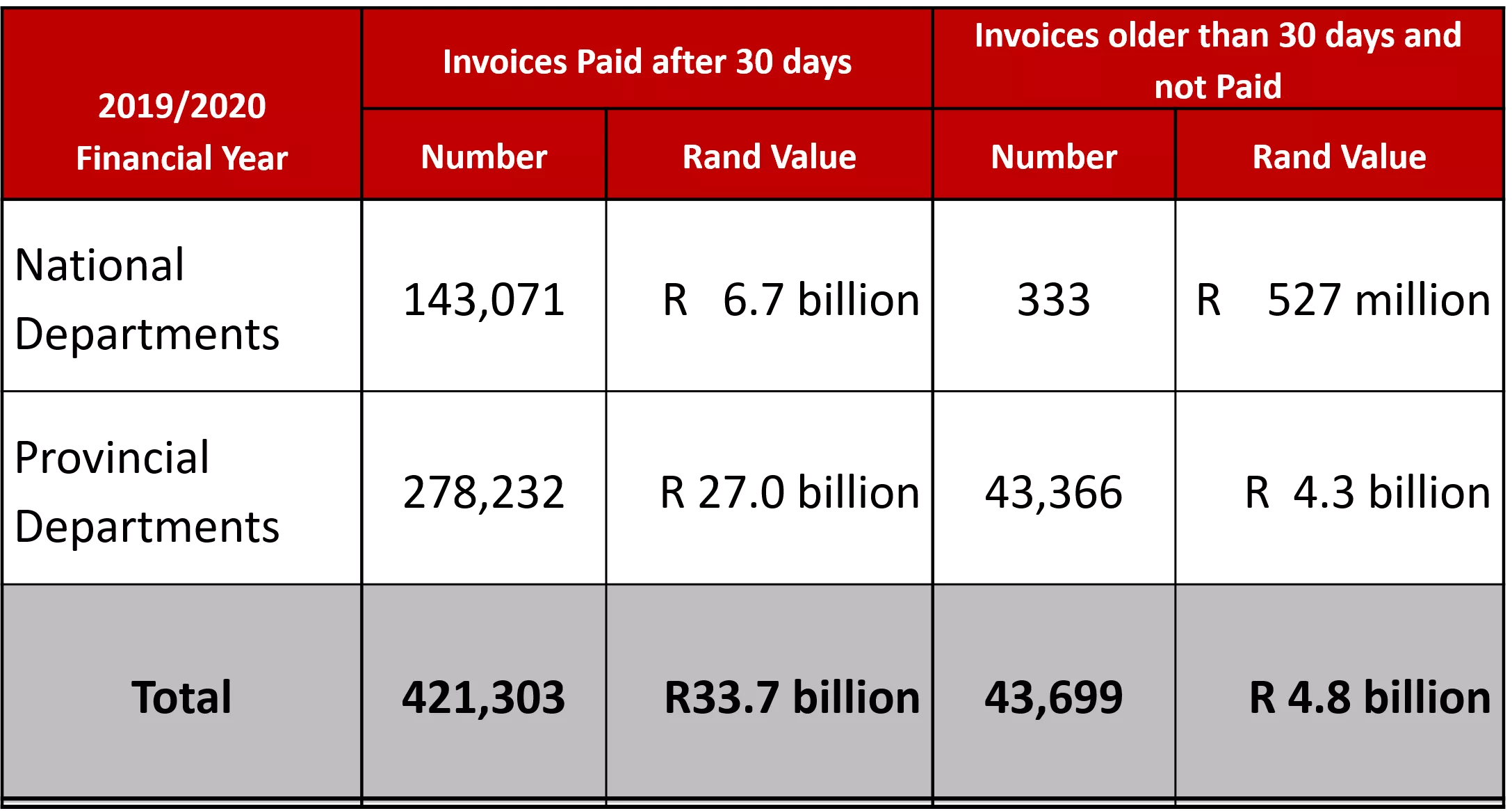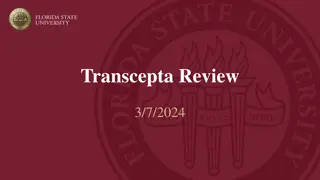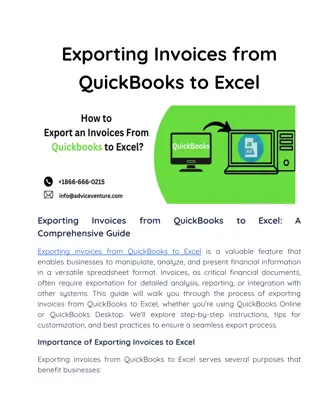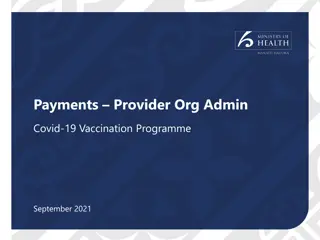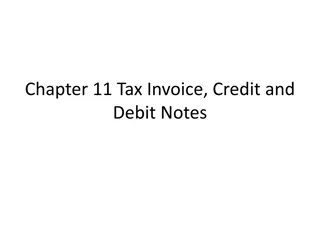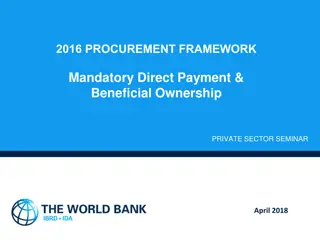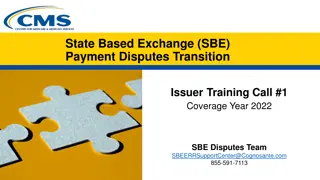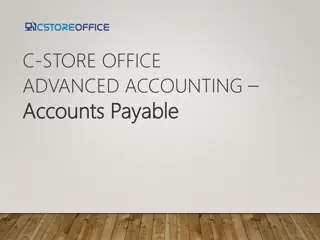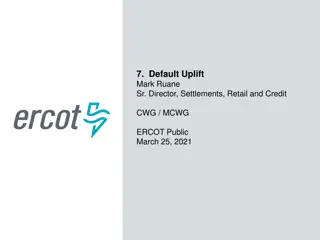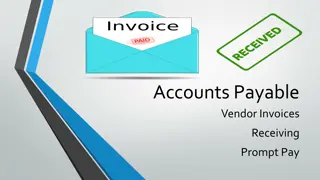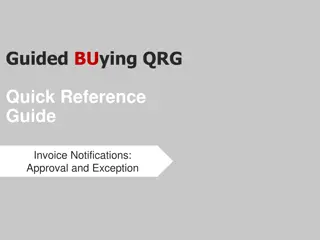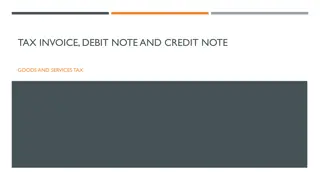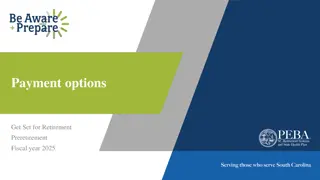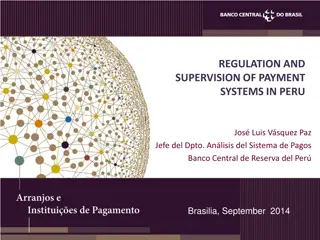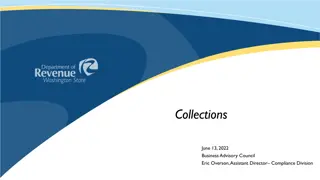Analysis of Invoices Payment Compliance in Government Departments
The analysis covers information on payment compliance within the government departments for the financial years 2019/2020 and 2020/2021. It highlights the challenges faced, such as delays in payments and non-compliance with the 30-day payment period. The main contributors to late payments are identified at both national and provincial levels, with reasons ranging from inadequate capacity to administrative challenges. Recommendations for improving payment processes are suggested based on the findings.
Download Presentation

Please find below an Image/Link to download the presentation.
The content on the website is provided AS IS for your information and personal use only. It may not be sold, licensed, or shared on other websites without obtaining consent from the author. Download presentation by click this link. If you encounter any issues during the download, it is possible that the publisher has removed the file from their server.
E N D
Presentation Transcript
30 DAYS INFORMATION 2019/2020 Financial Year Including information from April 2020 to December 2020 April 2021 1
CORRESPONDENCES 02 December 2009 Cabinet reiterated that Executive Authorities must ensure that their respective institutions implement mechanisms to ensure that payments to creditors are met within 30 (thirty) days from receipt of an invoice. 31 May 2010 National Treasury issued a Circular to institutions urging better compliance with TR 8.2.3 22 November 2010 Cabinet re-iterated its previous decision of 2 December 2009 regarding non-payment of suppliers within the prescribed period of 30 days from receipt of an invoice. 30 November 2011 the National Treasury issued Instruction Note No.34 which requires departments to submit monthly information related to non- compliance with TR 8.2.3 26 March 2018 the National Treasury issued a circular on the timeous payment of invoices and claim reminding institutions to pay for services and claims within the required period, and accounting officers to monitor compliance thereof. 2
INVOICES NOT PAID WITHIN 30 DAYS 2019/2020 FINANCIAL YEAR SUMMARY Invoices older than 30 days and not Paid Invoices Paid after 30 days 2019/2020 Financial Year Number Rand Value Number Rand Value National Departments 143,071 R 6.7 billion 333 R 527 million Provincial Departments 278,232 R 27.0 billion 43,366 R 4.3 billion Total 421,303 R33.7 billion 43,699 R 4.8 billion 3
INVOICES NOT PAID WITHIN 30 DAYS INFORMATION FROM APRIL 2020 TO DECEMBER 2020 Invoices older than 30 days and not Paid Period: April 2020 to December 2020 Invoices Paid after 30 days Number Rand Value Number Rand Value National Departments 55,629 R 2.6 billion 678 R 417 million Provincial Departments 178,037 R 19.5 billion 17,375 R 3.1 billion Total 233,666 R 22.1 billion 18,053 R 3.5 billion 4
NATIONAL AND PROVINCIAL DEPARTMENTS MAIN CONTRIBUTORS The main contributors at the national level in the number of invoices paid after 30 days and number of invoices older than 30 days and not paid in 2019/2020 financial years is the Justice and Protection Services cluster and the Central government cluster respectively and this is mainly due to, amongst others, inadequate internal capacity, ineffective internal controls and processes as well as budgetary constraints. The main contributors at the provincial level regarding the late and/or non-payment of invoices are the Departments of Health and during provincial visit to provincial health departments, it was clear that medico-legal claims, inefficiency and administrative challenges are the main cause for provincial Health departments struggling to pay legitimate invoices within 30 days. 5
COMMON REASONS LATE AND/OR NON-PAYMENT OF INVOICES National state of disaster and nation-wide lockdown Misfiled, misplaced or unrecorded invoices Unresolved invoice discrepancies Inadequate budget and/or cash flow management Inadequate internal capacity IT system issues (BAS, Logis and SafetyWeb, etc.) Incomplete supporting documents 6
INTERVENTIONS AND INITIATIVES ON PAYMENT OF INVOICES WITHIN 30 DAYS Non-payment of invoices: Queries received from suppliers investigate cases of non-payment of legitimate invoices by government institutions, identify root causes, facilitate the payment process of invoices with relevant departments and report on progress of these cases Visits to provincial department of Health The National Treasury in collaboration with DPME visited all provincial departments of Health and some provincial department of Education understand challenges that are faced by these departments in paying legitimate invoices within 30 days Roadshow to provinces by the Deputy Minister of Finance The roadshows were intended to engage provincial and local government leaders on issues relating to the application of prudent fiscal control measures in light of the constraints detailed in the budget speech as well as encouraging government departments at various levels to adhere to commitments made on payment of invoices within the stipulated 30-day period as a critical element to support SMMEs who do business with the state. Joint Health Action Plan Workshop The joint health action plan which was developed by the National Treasury and National Department of Health to address some of the challenges that exist within the health sector in areas of financial management, human resource management, infrastructure, increasing medico legal claims and improving quality of healthcare. 7
RECOMMENDATIONS Payment of invoices within 30 days be included in the performance agreements of accounting officers of each department; Accounting officers take disciplinary action against officials who fail to comply with the requirements to pay invoices within 30 days and who undermines the systems of internal control; Accounting officers take steps to ensure that the information to be submitted to the relevant treasury is duly signed off and submitted to the relevant treasury in accordance with the timeframes stipulated in Instruction Note number 34; Accounting officers to analyse the reasons provided for late and non-payment of invoices and institute investigations for financial misconduct, where necessary; Payment of suppliers within 30 days be a standing agenda item for discussion at every EXCO meeting of Departments; and Accounting officers should develop or improve internal control processes to ensure compliance with the legislative requirement to invoices within 30 days. 8
THANK YOU Compliance on Payment of Suppliers 9






